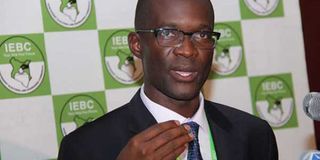Electoral commission gets Sh2.5bn to buy ballot papers

Independent Electoral and Boundaries Commission CEO Ezra Chiloba speaks during a past media briefing. The National Assembly has agreed to have IEBC given an additional Sh2.5 billion for ballot papers. PHOTO | JEFF ANGOTE | NATION MEDIA GROUP
What you need to know:
Mr Chiloba said the Dubai-based company, Al Ghurair, was given the contract as all other options were time-barred.
The KCB loan would attract interest at 14 per cent, which the IEBC and MPs were uncomfortable with.
Mr Chiloba said the Dubai-based company, Al Ghurair, was given the contract as all other options were time-barred.
The National Assembly’s Justice and Legal Affairs Committee has agreed to have the electoral commission given an additional Sh2.5 billion in this financial year to finance procurement of ballot papers.
The committee was told that among the options was to take out a loan from Kenya Commercial Bank, the Independent Electoral and Boundaries Commission’s (IEBC) banker.
IEBC chief executive Ezra Chiloba said the bank had been approached to provide the loan.
“KCB decided that it is something they can consider, especially with the fact that money had already been allocated, that was going to be our option,” said Mr Chiloba. “The CEO told me that he was going to send an officer to IEBC.”
ADDITIONAL ALLOCATION
Had that happened, he said, there would not have been a need to have the additional allocation.
The KCB loan, however, would attract interest at 14 per cent, which the IEBC and MPs were uncomfortable with.
Committee members however said that, given that the IEBC had been allocated money to buy the ballot papers in the Budget for the next financial year, there would be no problem giving them the money earlier.
Homa Bay Town MP Peter Kaluma said: “I now understand you. You are just seeking earlier payment of monies that are already budgeted. That gives me a lot of comfort.”
GIVEN CONTRACT
Mr Chiloba said the Dubai-based company, Al Ghurair, was given the contract as all other options were time-barred.
The commission would have needed 120 days to conclude a contract on open tender and 57 days on a restricted tender. Both were not feasible.
Rev Mutava Musyimi said that, from his past experience in the committee, he was surprised that a matter as grave as this had been taken to the Treasury before its approval.
Kisumu Town West MP Olago Aluoch, who chaired the meeting, said the explanation by IEBC would suffice.
“These proceedings are public and this matter is of utmost public importance,” he said.





